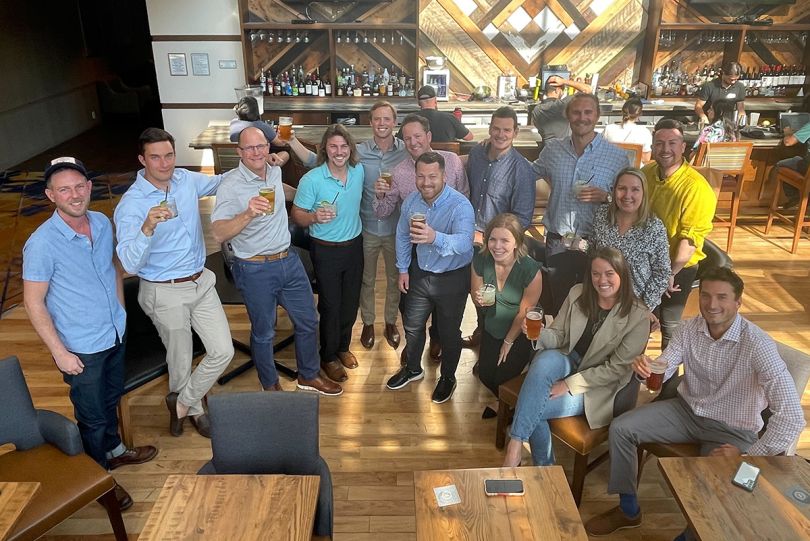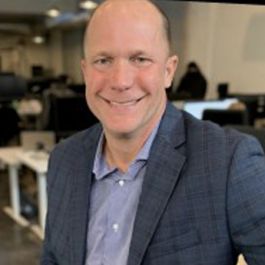It’s not often that a chief executive officer candidly screenshares their Slack conversations with a stranger. But that’s exactly what Grayson Morris did when he was asked, “What does Performio’s company culture look like in action?”
Among the mountains of kudos, jests, updates and celebration posts from employees is one of Morris’s favorite channels: #emerald-peacock.
The Slack channel — named after a dive bar near the company’s original Melbourne, Australia, headquarters — is a place to socialize. As Morris scrolls, it’s brimming with employee responses to an engagement activity called the Weekly Challenge.
This week the challenge was for individuals to share a story of the kindest thing someone has ever done for them. The stories span a range of emotions, from funny to heartfelt to tragic. One thing that unites them all is their vulnerability, and the outpouring of support from colleagues in response. It’s the kind of tenderness you’d expect more from a group text with your close friends than that of a public work Slack channel.
“A lot of companies pay lip service to culture. When we created our values we decided we did not want to be one of those companies that comes up with core values that don’t mean anything. We try to keep it front and center for our employees. It really resonates with people,” said Morris.
It’s bold of Morris to share his Slack like this. It’s also a perfect illustration of one of those crucial company core values: paint a clear picture.
How could you paint a clearer picture of a culture than that?
Performio’s Core Values
- Be curious
- Do the right thing
- Paint a clear picture
- Play to win
- Work as one
The caring culture on display in #emerald-peacock is also at the center of Performio’s big growth plans. The incentive-compensation management software company recently received a $75 million growth investment from JMI Equity in June 2022. The team will be using that funding to continue scaling, and the first big addition will be a chief people officer to preserve the je ne sais quoi that makes Performio so special.
The funding is a big win, but Morris and Luke Teeple, the company’s CFO and COO, saw it as validation of a good decision. Morris and Teeple purchased Performio together in 2019 after meticulously prospecting to over 5,200 companies and talking to over 500 of them to find just the right one.
“We were looking for a software business to be excited about, and Performio checked the most boxes. It has a very happy customer base, there’s a large market and the product solves customer problems really effectively,” said Teeple.
Since purchasing the company, Teeple and Morris have seen the company grow an average of 75 percent year over year for the last three years. They’ve also expanded the executive team, including the recent addition of Chief Revenue Officer Neil Graham in early 2022.
To learn more about how the company is planning to utilize its influx of funding — and preserve its culture — Built In spoke with Teeple, Morris and Graham about what’s on the horizon at Performio.

Neil, what made Performio an attractive company to join?
Chief Revenue Officer Neil Graham: What I loved about Performio was that there was a solid customer base with a ton of success and over 95 percent retention. That’s through the roof, best in class. There is a great product which I took some time to understand, and coming from go-to-market functions at scaling SaaS companies, I knew about the category. I knew about the latent, pent-up demand to make incentive compensation easier and more nimble. Performio was built in the cloud with no-code tools so it was easy to implement. The category existed, but the market leaders are using old technology so it is ripe for disruption. That’s pretty exciting. It’s technologically savvy and built on modern standards.
Tell us about this $75 million investment from JMI Equity.
Chief Financial Officer and Chief Operating Officer Luke Teeple: JMI brings a significant amount of operational know-how and support that we can benefit from. There is a really strong alignment between us as partners in the short term (over the next two years) and the greater vision for building a very large company over the next five to ten years.
How did you celebrate the deal?
Graham: We got right back to work.
Teeple: There’s a lot to do. This is an intermediate step. Victory is $100 million in revenue. We anticipate there could be a couple of these on the way to that goal. But, if anything, this reinvigorated and reenergized the team to keep doing what they are doing. It’s independent verification from a smart group of people that we are headed in the right direction.
As you utilize this funding, what sets your growth strategy apart from competitors?
Chief Executive Officer Grayson Morris: We are thoughtful stewards of our capital. We’re experienced operators, we’ve all gone through these cycles. This isn’t anything radically new, but in a time where a lot of companies are struggling to get funding, layoffs are happening and valuations are decreasing, we’re going in the opposite direction. It’s validation that what we are doing is working. We review and adjust our hiring plan every month based on macroeconomic conditions, current run rate on revenue and budget expenses. We never want to put ourselves in a position where we have to do layoffs, that would be tremendously difficult and challenging for our culture. We’d rather get ahead of that and solve the problem up front by not overhiring.
“In a time where a lot of companies are struggling to get funding, layoffs are happening and valuations are decreasing, we’re going in the opposite direction.”
Teeple: You see a lot of headlines out there about companies pulling the brakes in this environment. But we’ve always been thoughtful about the right size of the team, so this isn’t a change in how we operate. We highly value the commitments we make to our teammates. We have an intensive hiring process where we try to give people jobs that fit them well. This funding allows people to have more opportunity to move up when they demonstrate success. We’ve always been a culture that prefers to promote internally when possible, we have a lot of people that have moved up. It’s important to us that people see a path forward and long-term vision of their career.
Graham: The onboarding and enablement here is stellar for a company of our size. I’ve been at growth companies in similar trajectories and seen the polar opposite. There is a whole platform for onboarding enablement with pre-recorded sessions, learning tracks and key content by role. There’s a mini bootcamp, and every employee goes through an exercise of implementing and converting a fictitious company from an Excel-based incentive compensation platform to our platform. Each employee learns the product, market and value. It’s fundamental to being thought leaders in this category and truly understanding the challenges our customers and prospective customers face in incentive compensation management; so we can continue to innovate and support the market with unique capabilities and expertise. Resultingly, we’ve achieved high levels of employee domain expertise and talent, high levels of connectedness with our market and our vision, and high levels of retention across our employee base.
The Koala Convention

Tell us about your culture. Who is a good fit for this company?
Morris: We evaluate all candidates against our five core values. If you exhibit those values and have a high standard of excellence, then you’ll be a good fit.
Graham: We have a “no asshole” philosophy. People listen, they are consultative, they are thoughtful. We are focused on our employees, our customers and our partners. From the top down we are transparent and communicative. I was personally looking for that, because I had been in some siloed, closed environments where companies break as they scaled to hit 40 to 60 million in revenue. We’ve got a well-built mission statement and core values we subscribe to. While I was interviewing, I was pulled into meetings to meet the team, which I’d never experienced before as a candidate. When we interview people, we encourage that. We want people to get a full view of the company. Every hire is critical. That’s a big differentiator here.
“We have a ‘no asshole’ philosophy. People listen, they are consultative, they are thoughtful.”
How do you plan to maintain your culture through this period of growth?
Morris: This is something we think about daily, from the cadence of our meetings to the pulse surveys. We know we have to get it right. It takes the hard work of thinking about what created that culture in the first place, which is hiring great people and instilling our values. We have employees across three continents and a weekly all-hands for each of them. We have regular communication across our channels and reinforcing the values, giving recognition to people who are living our values and, frankly, parting ways with those who don’t.
Teeple: As part of this expansion we’re building out a more robust executive team. Neil was an early hire, and we’re investing in a chief people officer because the focus on maintaining culture, making sure this is an exciting and attractive place for people to work, is worth it. That person’s job is to make sure we’re on track as we grow.
What else should job candidates know about Performio?
Morris: Obviously, you’re talking to three people who have a vested interest in making our company seem great. We realize that. But anybody who wants to work here would talk to our employees, it’s part of the interview process. I think you would find that they agree and corroborate. The proof is in the pudding. Based on our online reviews, our monthly pulse surveys and the conversations we have with employees I think people enjoy working here and feel like they can make a big impact on the company, and have fun while they are doing it.








